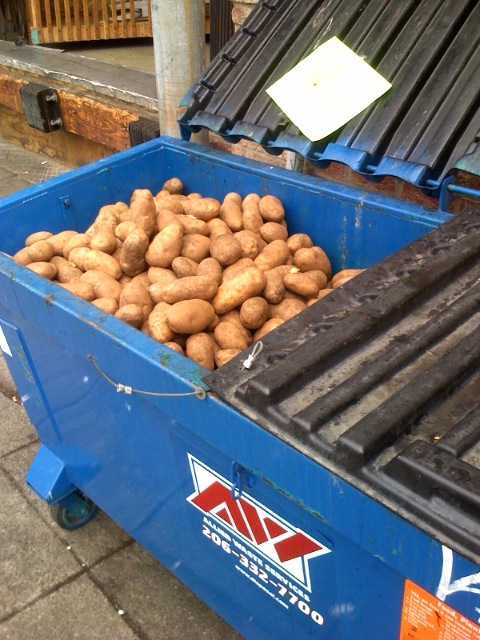
Image: by the lone conspirator [CC BY 2.0, via Wikimedia Commons
Over 800 million people – one in nine worldwide – live with chronic hunger. Yet in the midst of global starvation, huge amounts of food are being discarded by retailers and consumers.
- Some 40% of all the food produced in the United States is never eaten.
- In Europe, 100 million tonnes of food is thrown away every year.
- The UK produces 15 million tonnes of food waste every year, more than any other European country.
The costs of food waste
Apart from the ethical concerns, food waste has significant economic and environmental impacts. Some of these are clear to see, while others are hidden costs.
In 2007 the Waste and Resources Action Programme (WRAP) estimated that wasted food costs each UK household between £250 and £400 a year. This doesn’t include council tax payments contributing to the cost of local authorities’ disposal of food waste, much of which goes to landfill sites, where it generates methane and other greenhouse gases.
Scarce resources are being used in the production of food that will never be consumed. Every product has its own “water footprint” – the amount of water consumed in its production. In 2011, research by WRAP found that the water footprint of food waste was 6,200 million cubic metres per year.
Love food, hate waste
Addressing the problem of food waste is clearly a colossal challenge. But that’s no reason to give up. Since 2007, WRAP, the registered charity that works with businesses, individuals and communities to help reduce waste, has been running a highly successful Love Food Hate Waste campaign in partnership with retailers, food manufacturers, local government and community groups. Between 2007 and 2012, the campaign helped reduce avoidable food waste by 21%. That’s more than one million tonnes of food saved from landfill (or enough to fill 23 million wheelie bins). The campaign is also estimated to have saved consumers £3.3 billion a year and councils around £85 million.
Local action on food waste
Individual local authorities are also doing their bit to reduce the amount of public money used to dispose of food waste as rubbish. Councils in areas such as Cardiff, West Lothian and Oxford have been providing separate food waste caddies for collection. The food can then be recycled either by composting for fertilisers, or by anaerobic digestion for conversion to biogas to generate electricity, heat or transport fuels. Some local authorities, such as Central Bedfordshire are also encouraging home composting by providing householders with subsidised composting bins for kitchen and garden waste.
Donating food to charities
While the bulk of food wasted annually in the UK comes from households, supermarkets also generate substantial amounts.
In 2013, the British Retail Consortium estimated that seven supermarket chains were responsible for 200,000 tonnes of food wastage. In response, some of the UK’s leading supermarkets such as Sainsbury’s, the Co-op, and Tesco have been working with the FareShare charity to rescue thousands of tonnes of food from landfill for redistribution to vulnerable people across the UK in homeless shelters, women’s refuges and children’s breakfast clubs.
At the moment, these are voluntary schemes, but an initiative by a local councillor in France might ultimately lead to legislation compelling supermarkets across Europe to donate unwanted food to charity.
Earlier this year, Arash Derambarsh persuaded the French parliament to pass a law barring supermarkets from destroying food approaching its best-before date. He is now lobbying the European parliament to follow suit by including an amendment in its new “circular economy” directive.
Consumers also have a role to play, for example by choosing misshapen fruit and vegetables that would be otherwise be destined for the bin, buying just the things we need, and understanding the difference between “best before” and “use by” dates.
Good work has been carried out in raising awareness of, and addressing, food waste. However, given the colossal scale of the problem, further progress will depend on concerted actions by governments, food suppliers, retailers and consumers.
The Idox Information Service can give you access to a wealth of further information on waste management; to find out more on how to become a member, contact us.
Follow us on Twitter to see what developments in public and social policy are interesting our research team.
Further reading*
A taste for reducing food waste (in the public sector)
Sector bursts with ideas on boosting bioresources (food waste policy)
Strategies to achieve economic and environmental gains by reducing food waste
The seller of food that the shops cannot sell (food waste)
Waiter! More doggy bags, please (designer doggy bags to reduce restaurant food waste)
*Some resources may only be available to members of the Idox Information Service
Share
Related Posts
Supporting residents on the decarbonisation journey: leveraging data for effective retrofit projects
As the drive towards decarbonisation intensifies, the social housing sector’s ability to collect, store and manage vast amounts of data becomes increasingly critical. With a shared goal of creating warmer, carbon-free homes, housing associations’ strategic use of data is essential ....
The recent spikes in energy costs have thrown into sharp focus the challenge of heating our homes. Domestic heating is important, not just for our comfort and wellbeing, but to reduce humidity and prevent condensation. But because traditional heating systems ....
By Ian Babelon A new-old concept for proximity “Are we there yet?” Parents may patiently nod to their children’s insistent nudges on a 20-minute journey to… somewhere. Quite rightly, researchers have asked: twenty minutes to what? The answer may well ....
By Sarah Perry At the end of June, GrantFinder attended The Chartered Institute of Housing’s annual conference, Europe’s largest housing festival. The event took centre stage at Manchester Central, bringing together industry experts, policymakers, and housing practitioners from across the ....
